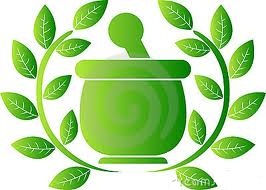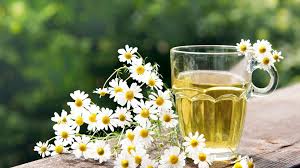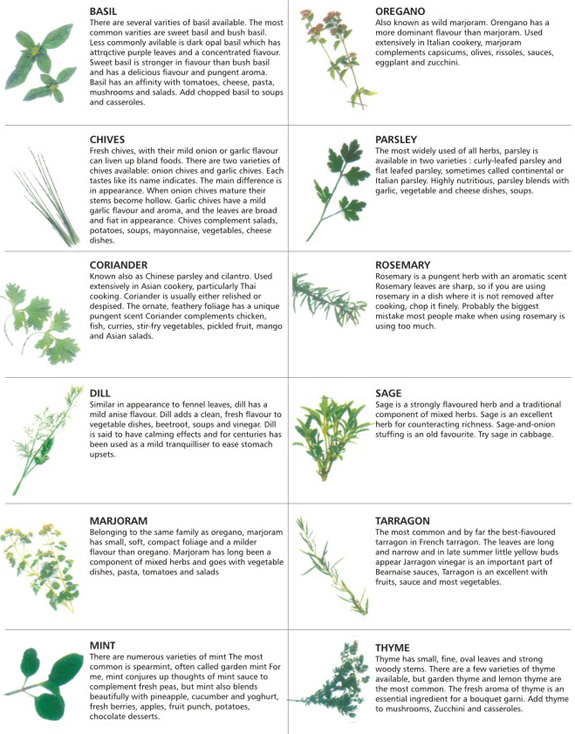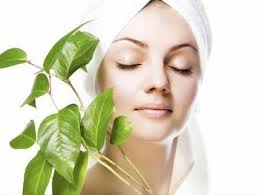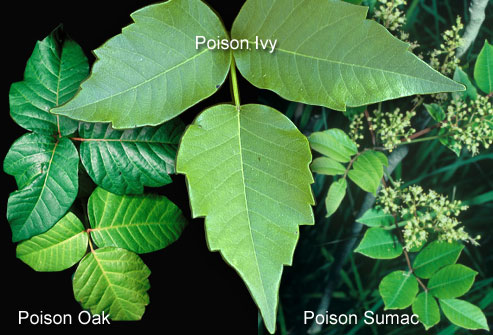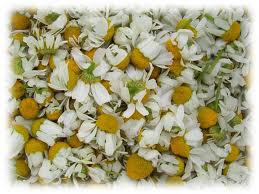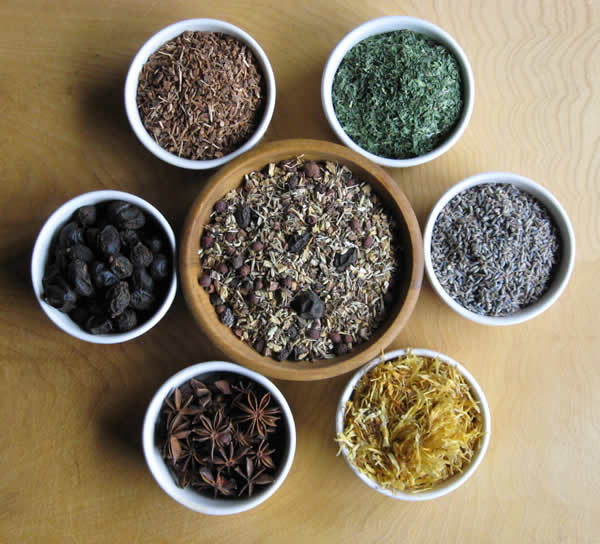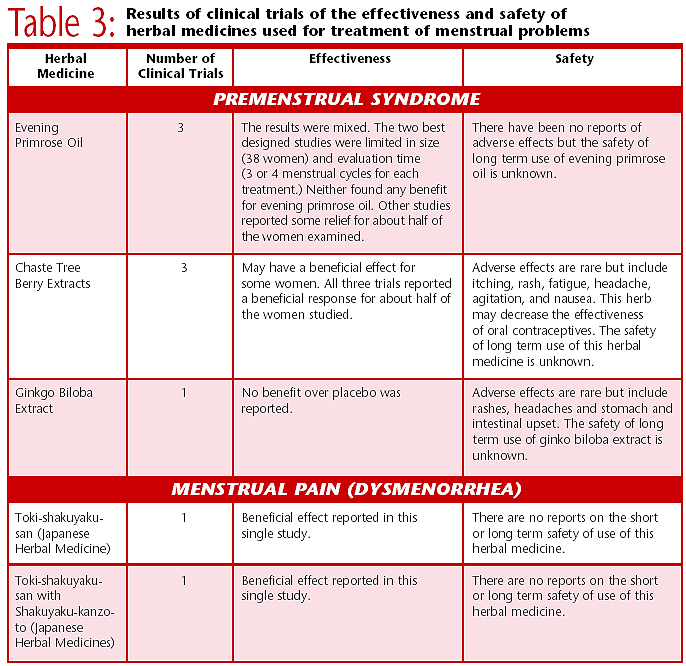What is herbal
medicine?
Herbal
medicine -- also called botanical medicine or phytomedicine --
refers to using a plant's seeds, berries, roots, leaves, bark, or
flowers for medicinal purposes. Herbalism has a long tradition of
use outside of conventional medicine. It is becoming more
mainstream as improvements in analysis and quality control along
with advances in clinical research show the value of herbal
medicine in the treating and preventing disease.
What is the
history of herbal medicine?
Plants
had been used for medicinal purposes long before recorded history.
Ancient Chinese and Egyptian papyrus writings describe medicinal
uses for plants as early as 3,000 BC. Indigenous cultures (such as
African and Native American) used herbs in their healing rituals,
while others developed traditional medical systems (such as
Ayurveda and Traditional Chinese Medicine) in which herbal
therapies were used. Researchers found that people in different
parts of the world tended to use the same or similar plants for the
same purposes.
In the
early 19th century, when chemical analysis first became available,
scientists began to extract and modify the active ingredients from
plants. Later, chemists began making their own version of plant
compounds and, over time, the use of herbal medicines declined in
favor of drugs. Almost one fourth of pharmaceutical drugs are
derived from botanicals.
Recently, the World
Health Organization estimated that 80% of people worldwide rely on
herbal medicines for some part of their primary health care. In
Germany, about 600 - 700 plant based medicines are available and
are prescribed by some 70% of German physicians. In the past 20
years in the United States, public dissatisfaction with the cost of
prescription medications, combined with an interest in returning to
natural or organic remedies, has led to an increase in herbal
medicine use.
How do herbs
work?
In many
cases, scientists aren' t sure what specific ingredient in a
particular herb works to treat a condition or illness. Whole herbs
contain many ingredients, and they may work together to produce a
beneficial effect. Many factors determine how effective an herb
will be. For example, the type of environment (climate, bugs, soil
quality) in which a plant grew will affect it, as will how and when
it was harvested and processed.
How are herbs
used?
The use
of herbal supplements has increased dramatically over the past 30
years. Herbal supplements are classified as dietary supplements by
the U.S. Dietary Supplement Health and Education Act (DSHEA) of
1994. That means herbal supplements -- unlike prescription drugs --
can be sold without being tested to prove they are safe and
effective. However, herbal supplements must be made according to
good manufacturing practices.
The
most commonly used herbal supplements in the U.S. include echinacea
(Echinacea purpurea and related species), St. John's
wort (Hypericum perforatum), ginkgo (Ginkgo
biloba), garlic (Allium sativum), saw palmetto
(Serenoa repens), ginseng (Panax ginseng, or
Asian ginseng; and Panax quinquefolius, or
American ginseng), goldenseal (Hydrastis canadensis),
valerian (Valeriana officinalis), chamomile
(Matricaria recutita), feverfew (Tanacetum
parthenium), ginger (Zingiber officinale), evening
primrose (Oenothera biennis), and milk thistle
(Silybum marianum).
Often,
herbs may be used together because the combination is more
effective and may have fewer side effects. Health care providers
must take many factors into account when recommending herbs,
including the species and variety of the plant, the plant's
habitat, how it was stored and processed, and whether or not there
are contaminants (including heavy metals and
pesticides).
What is herbal
medicine good for?
Herbal
medicine is used to treat many conditions, such as asthma, eczema,
premenstrual syndrome, rheumatoid arthritis, migraine, menopausal
symptoms, chronic fatigue, irritable bowel syndrome, and cancer,
among others. Herbal supplements are best taken under the guidance
of a trained health care provider. For example, one study found
that 90% of arthritic patients use alternative therapies, such as
herbal medicine.Be sure to consult with your doctor or pharmacist
before taking any herbs. Some common herbs and their uses are
discussed below.
- Ginkgo
(Ginkgo biloba) has been used in traditional medicine to
treat circulatory disorders and enhance memory. Although not all
studies agree, ginkgo may be especially effective in treating
dementia (including Alzheimer's disease) and intermittent
claudication (poor circulation in the legs). It also shows promise
for enhancing memory in older adults. Laboratory studies have shown
that ginkgo improves blood circulation by dilating blood vessels
and reducing the stickiness of blood platelets. By the same token,
this means ginkgo may also increase the effect of some blood
thinning medications, including aspirin. People taking blood
thinning medications should ask their doctor before using ginkgo.
Caution should also be taken with people with a history of seizures
and people with fertility issues; speak with your
physician.
- Kava
kava (Piper methysticum) is said to elevate mood, enhance
well being and contentment, and produce a feeling of relaxation.
Several studies have found that kava may be useful in the treatment
of anxiety, insomnia, and related nervous disorders. However, there
is serious concern that kava may cause liver damage. It's not clear
whether the kava itself caused liver damage in a few people, or
whether it was taking kava in combination with other drugs or
herbs. It's also not clear whether kava is dangerous at previously
recommended doses, or only at higher doses. Some countries have
taken kava off the market. It remains available in the United
States, but the Food and Drug Administration (FDA) issued a
consumer advisory in March of 2002 regarding the "rare" but
potential risk of liver failure associated with kava containing
products.
- Saw
palmetto (Serenoa repens) is used by more than 2
million men in the United States for the treatment of benign
prostatic hyperplasia (BPH), a non cancerous enlargement of the
prostate gland. A number of studies suggest that the herb is
effective for treating symptoms, including frequent urination,
having trouble starting or maintaining urination, and needing to
urinate during the night. But a well-conducted study published in
the February 9, 2006 edition of the New England Journal of
Medicine found that saw palmetto was no better than
placebo in relieving the signs and symptoms of BPH.
- St.
John's wort (Hypericum perforatum) is well known for its
antidepressant effects. In general, most studies have shown that
St. John's wort may be an effective treatment for mild to moderate
depression, and has fewer side effects than most other prescription
antidepressants. But the herb interacts with a wide variety of
medications, including birth control pills, and can potentially
cause unwanted side effects, so it is important to take it only
under the guidance of a health care provider.
- Valerian
(Valeriana officinalis) is a popular alternative to
commonly prescribed medications for sleep problems because it is
considered to be both safe and gentle. Some studies bear this out,
although not all have found valerian to be effective. Unlike many
prescription sleeping pills, valerian may have fewer side effects,
such as morning drowsiness. However, Valerian does interact with
some medications, particularly psychiatric medications, so you
should speak to your doctor to see if Valerian is right for
you.
- Echinacea preparations
(from Echinacea purpurea and
other Echinacea species) may improve the body's
natural immunity. Echinacea is one of the most commonly used herbal
products, but studies are mixed as to whether it can help prevent
or treat colds. A review of 14 clinical studies examining the
effect of echinacea on the incidence and duration of the common
cold found that echinacea supplements decreased the odds of getting
a cold by 58%. It also shortened the duration of a cold by 1.4
days. Echinacea can interact with certain medications and may not
be right for people with certain conditions, for example people
with autoimmune disorders or certain allergies. Speak with your
physician.
Buying
standardized herbal supplements helps ensure you will get the right
dose and the effects similar to human clinical trials. Ask your
doctor or pharmacist about which herbal supplements are best for
your health concerns.
Is there
anything I should watch out for?
Used
correctly, herbs can help treat a variety of conditions, and in
some cases, may have fewer side effects than some conventional
medications. But because they are unregulated, herbal products are
often mislabeled and may contain additives and contaminants that
aren' t listed on the label. Some herbs may cause allergic
reactions or interact with conventional drugs, and some are toxic
if used improperly or at high doses. Taking herbs on your own
increases your risk, so it is important to consult with your doctor
or pharmacist before taking herbal medicines. Some examples of
adverse reactions from certain popular herbs are described
below.
- St.
John's wort can cause your skin to be more sensitive to the sun's
ultraviolet rays, and may cause an allergic reaction, stomach
upset, fatigue, and restlessness. Clinical studies have found that
St. John's wort also interferes with the effectiveness of many
drugs, including the blood thinner warfarin (Couamdin), protease
inhibitors for HIV, birth control pills, certain asthma drugs, and
many other medications. In addition, St. John's wort should not be
taken with prescribed antidepressant medication. The FDA has issued
a public health advisory concerning many of these
interactions.
- Kava
kava has been linked to liver toxicity. Kava has been taken off the
market in several countries because of liver toxicity.
- Valerian may cause
sleepiness, and in some people it may even have the unexpected
effect of overstimulating instead of sedating.
- Garlic, ginkgo,
feverfew, and ginger, among other herbs, may increase the risk of
bleeding.
- Evening
primrose (Oenothera biennis) may increase the
risk of seizures in people who have seizure disorders and bleeding
in people with bleeding disorders or who take blood thinning
medications, such as Coumadin (Warfarin).
Some
herbal supplements, especially those imported from Asian countries,
may contain high levels of heavy metals, including lead, mercury,
and cadmium. It is important to purchase herbal supplements from
reputable manufacturers to ensure quality. Many herbs can interact
with prescription medications and cause unwanted or dangerous
reactions. For example, there is a high degree of herb/drug
interaction among patients who are under treatment for cancer. Be
sure to consult your doctor before trying any herbal
products.
Who is using
herbal medicine?
Nearly
one-third of Americans use herbs. Unfortunately, a study in
the New England Journal of Medicine found that
nearly 70% of people taking herbal medicines (most of whom were
well educated and had a higher-than-average income) were reluctant
tell their doctors that they used complementary and alternative
medicine.
How is herbal
medicine sold in stores?
The
herbs available in most stores come in several different forms:
teas, syrups, oils, liquid extracts, tinctures, and dry extracts
(pills or capsules). Teas can be made from dried herbs left to soak
for a few minutes in hot water, or by boiling herbs in water and
then straining the liquid. Syrups, made from concentrated extracts
and added to sweet tasting preparations, are often used for sore
throats and coughs. Oils are extracted from plants and often used
as rubs for massage, either by themselves or as part of an ointment
or cream. Tinctures and liquid extracts are made of active herbal
ingredients dissolved in a liquid (usually water, alcohol, or
glycerol). Tinctures are typically a 1:5 or 1:10 concentration,
meaning that one part of the herb is prepared with 5 - 10 parts (by
weight) of the liquid. Liquid extracts are more concentrated than
tinctures and are typically a 1:1 concentration. A dry extract form
is the most concentrated form of an herbal product (typically 2:1 -
8:1) and is sold as a tablet, capsule, or lozenge.
No
organization or agency regulates the manufacture or certifies the
labeling of herbal preparations. This means you can't be sure that
the amount of the herb contained in the bottle, or even from dose
to dose, is the same as what is stated on the label. Some herbal
preparations are standardized, meaning that the preparation is
guaranteed to contain a specific amount of the active ingredients
of the herb. However, it is still important to ask companies making
standardized herbal products about their product's guarantee. It is
important to talk to your doctor or an expert in herbal medicine
about the recommended doses of any herbal products.
Are there
experts in herbal medicine?
Herbalists,
chiropractors, naturopathic physicians, pharmacists, medical
doctors, and practitioners of Traditional Chinese Medicine all may
use herbs to treat illness. Naturopathic physicians believe that
the body is continually striving for balance and that natural
therapies can support this process. They are trained in 4-year,
postgraduate institutions that combine courses in conventional
medical science (such as pathology, microbiology, pharmacology, and
surgery) with clinical training in herbal medicine, homeopathy,
nutrition, and lifestyle counseling.
How can I find
a qualified herbalist in my area?
For
additional information, or to locate an experienced herbalist in
your area, contact the American Herbalists Guild (AHG) at site
at www.americanherbalistguild.com. To located a licensed
naturopath in your area, call the American Association of
Naturopathic Physicians (AANP)
at www.naturopathic.org.
What is the
future of herbal medicine?
In some
countries in Europe -- unlike the U.S. -- herbs are classified as
drugs and are regulated. The German Commission E, an expert medical
panel, actively researches their safety and
effectiveness.
While
still not widely accepted, herbal medicine is being taught more in
medical schools and pharmacy schools. More health care providers
are learning about the positive and potentially negative effects of
using herbal medicines to help treat health conditions. Some health
care providers, including doctors and pharmacists, are trained in
herbal medicine. They can help people create treatment plans that
use herbs, conventional medications, and lifestyle changes to
promote health.
